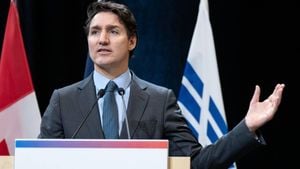The situation surrounding the Ukraine conflict has reached new heights of tension, particularly following U.S. President Joe Biden's recent decision to allow Ukraine to deploy long-range U.S. missiles to strike targets within Russia. This move has garnered stern warnings from Moscow as tensions escalate between the two countries. The conflict continues to have grave repercussions, illustrated by multiple attacks resulting in civilian casualties. Just last week, for example, major strikes on the Ukrainian city of Sumy resulted in the deaths of eleven individuals, including children.
On November 18, 2024, this change of U.S. military policy prompted significant backlash from the Kremlin, which labeled the action as provocative. Iran and North Korea were also mentioned as probable allies of Russia, reinforcing the multi-faceted nature of the conflict. The Biden administration's decision is seen as stepping back from earlier cautious approaches toward Ukraine's engagement with Russian territory. During this time, the Ukrainian conflict has continued to escalate, with heavy Russian missile strikes reported, leading to numerous casualties among civilians and servicemen alike.
Further complications emerged when Biden’s decision was viewed as potentially exacerbated relations not only with Russia but also impacting the broader European security framework. According to reports, Russian President Vladimir Putin’s government indicated this could heighten risks of World War Three, raising concerns among Western diplomats about the potential re-escalation of military actions and hybrid warfare across Europe.
Former British Ambassador to Russia, Sir Toby Brenton, commented on the situation, stating, "Nobody is really expecting this to be a game-changer." He mentioned the tendency for Russian forces to advance, indicating a continued Russian push through various fronts, especially around key areas like Donetsk, where major battles are being fought. Sir Toby underscored the potential limitations of the newly available missiles, emphasizing they may not make as substantial of an impact as intended due to insufficient quantities.
Meanwhile, the toll on civilian life has been severe. The number of fatalities from the recent missile attack on Odesa, for example, rose to ten. Odesa's local governor, Oleg Kiper, reported the loss of seven police officers, including medical personnel and civilians. Among the wounded are several children, with the overall impact sparking outrage and grief across the nation.
President Volodymyr Zelenskyy, addressing the calamity, condemned the targeted strikes and reaffirmed his resolve against Russian aggression. He has emphasized the necessity of international support for Ukraine amid what he characterized as calculated and deliberate attacks on innocent civilians. The situation has left many questioning the effectiveness of diplomatic strategies as more significant military confrontations loom.”
With these developments, conversations about the role of Western allies, including the UK, remain intense. Speculation has arisen about whether the UK will follow suit and allow Ukraine to deploy British missiles deep inside Russia. Yet, at present, Downing Street officials have kept their stance vague. A spokesperson reiterated the commitment to work closely with allies for Ukraine's benefit but declined to provide specific operational details, emphasizing the sensitivity of the current situation.
Your call-out for clarity continues with Polish President Andrzej Duda insisting on the importance of U.S. support for Ukraine, declaring it as a “potentially decisive moment” for the outcome of the war. Duda reaffirmed the solidarity of Poland with Ukraine and criticized Germany for showing potential signs of negotiating with Russia over energy contracts, worries shared by many European allies. His remarks showcase the varied approach among Western nations on how to confront the Russian threat, pitting more hawkish Eastern European states against comparatively cautious Western European allies.
To stir the pot, Ivor Bennett, Sky News's Moscow correspondent, pointed out the Kremlin’s long-standing narrative portraying Russia as the victim of Western aggression. He highlighted the rhetoric from Russian officials denouncing the U.S. decisions as acts of escalation. Comments from Kremlin spokesman Dmitry Peskov elaborated on these sentiments, accusing Washington of intensifying conflicts rather than quelling them.
The international ramifications of the U.S.'s military support to Ukraine cannot be understated. Besides its complex effects on the ground, this will likely shift perceptions of military engagements and alliances throughout Europe. With Russian forces actively changing their military doctrine—including changes aimed at justifying nuclear responses—analysts are warning of the unpredictability, but simply advising caution against assumptions of rationality from the Kremlin.
The ever-evolving situation has drawn contrasting interpretations from military experts. Some advocate against underestimations of Russian capabilities, cautioning against premature assumptions of Ukraine's operational effectiveness with limited resources. The three-dimensional nature of modern warfare means these missile capabilities, when combined with other opportunities from NATO support, could provide sufficient deterrence against Russian advances.
While the international community remains vigilant, calls for sustained support for Ukraine remain strong. Observers await developments on the ground as the next chapters of this conflict offer no instant resolutions, only increasing levels of engagement between Ukrainian forces and their Western counterparts against their formidable adversary. The hope is to sustain the defensive lines, maintain sacrifices made, and, perhaps, pivot back to diplomatic strategies when negotiations become conceivable and practical on the geopolitical chessboard.



